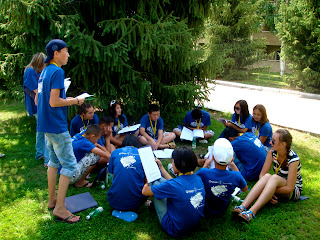I must apologize to you readers. I’ve been missing in action for the last bit. I could bore you with the details of my delayed post or I could simply talk about something much more interesting- my host family. I realized I have yet to tell you all about my host family members- people whom time spent reading about would certainly not be time wasted.
During Pre-Service Training (essentially the first 2 months of a Peace Corps Volunteer’s service) we are told horror stories of past volunteer host family experiences along with those glorious success stories. Of course, a wide-eyed trainee hopes to be one of the success stories, hopes to be placed with an incredible host family and build a bond that will last long after the volunteer has finished their service. I’m happy to say I’m experiencing my very own success story.
I call my host father and mother “Baike” and “Eje” which literally translates to “older brother” and “older sister” and are terms of respect the Kyrgyz use for older members of society. My Baike and Eje are both in their late 40s and have three daughters and one son. Unlike my Eje whom I lived with during training who took until the end of the two months to call me her “Kuhz” or “daughter”, my Baike and Eje immediately referred to me as their “Kuhzm” or “my daughter”. I was automatically a member of the family.
By Kyrgyz village standards, my family is on the wealthier side of life. My Baike is a jack-of-all-trades businessman and my Eje owns and runs her own Café down the street from our house. My Baike is very respected in the village, I have yet to make mention of his name without all those in earshot knowing who he is. He is incredibly hardworking. Our morning routine is paralleled before the sun rises and he goes to bed several hours after I’m fast asleep. He is charismatic with a warm smile that makes me feel as though I was never a guest and I’ve always only lived here.
My Eje is what I like to refer to as a gentle spirit. While other older Kyrgyz women use their age as status and reason to boss younger people around, my Eje is the opposite. Like my Baike, she is very hardworking with some of the roughest hands I’ve seen on a woman. Grabbing a boiling teakettle’s metal handle off the stove doesn’t faze her. One night she was ill and stopped cooking long enough to step outside to throw up then quickly washed her face and continued cooking while laughing at herself. She is the epitome of strength while at the same time the cornerstone of compassion in her family. She constantly hugs her children and showers them with kisses.
My sibling I’ve grown closest to is my 15-year-old sister, Altynai. She is a beautiful, innocent, graceful teenage girl with all of the potential in the world. She is shy when speaking her broken English, but her boisterous laugh could make the grumpiest old man smile. She is polite towards people she does not know and very respectful towards her parents. As the oldest girl (currently living at home), Altynai does the majority of the household chores while her parents are working outside the home. When I first came to live with my family, Altynai would ask me to accompany her to the store to buy food for the café. One time she asked me to go with her after dark and while walking with her and our cousin in the pitch black (something entirely normal for these girls), I linked my arm through hers for safety. Since that time, anywhere we walk together, even in the bright of day, Altynai immediately links her arm with mine.
The last two members of my host family are possibly the most entertaining of the bunch: My 8-year-old brother, Begsat, and my 4-year-old sister, Bermet. Begsat is a loud, macho (if you can picture it) young boy who loves playing in the street with his friends and enjoys teasing his younger sister. He is suspicious of any food I make that is unfamiliar to him- what else should I expect from an 8-year-old boy? Bermet is very shy at first but once she gets comfortable around you, you had better be ready for it. During one of my first meals with my family we were trying to piece together English and Kyrgyz in order to understand one another. Bermet was stealing food from everyone’s plates and my Eje was calling her “tentek” or “naughty”. She asked me how to say “tentek” in English and I told her. Then, as I should have expected, my siblings start calling Bermet “naughty” in English. Without knowing what “naughty” means, but understanding it wasn’t a positive thing by my siblings’ taunting, Bermet blurts out “naught emesmen!”- a quasi English Kyrgyz sentence meaning “I’m not naughty!”
So there you have it folks, the members of my Kyrgyz family. I’m thankful for their friendly, hospitable, open, easygoing, kind, loving nature everyday. I couldn’t have been placed with a better group of people.















.JPG.crdownload)







